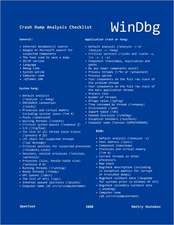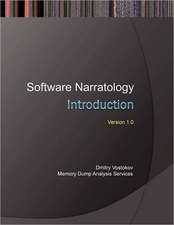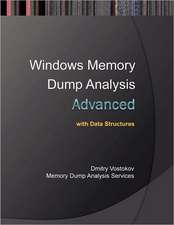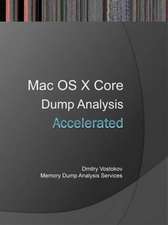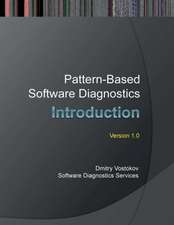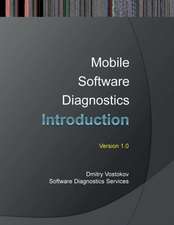Memory Dump Analysis Anthology, Volume 6
Autor Dmitry Vostokoven Limba Engleză Paperback – 24 ian 2013
| Toate formatele și edițiile | Preț | Express |
|---|---|---|
| Paperback (1) | 193.43 lei 22-36 zile | |
| Opentask – 24 ian 2013 | 193.43 lei 22-36 zile | |
| Hardback (1) | 229.03 lei 22-36 zile | |
| Opentask – 24 mar 2013 | 229.03 lei 22-36 zile |
Preț: 193.43 lei
Preț vechi: 241.78 lei
-20% Nou
Puncte Express: 290
Preț estimativ în valută:
37.02€ • 40.23$ • 31.12£
37.02€ • 40.23$ • 31.12£
Carte disponibilă
Livrare economică 31 martie-14 aprilie
Preluare comenzi: 021 569.72.76
Specificații
ISBN-13: 9781908043191
ISBN-10: 1908043199
Pagini: 306
Dimensiuni: 152 x 229 x 18 mm
Greutate: 0.45 kg
Editura: Opentask
ISBN-10: 1908043199
Pagini: 306
Dimensiuni: 152 x 229 x 18 mm
Greutate: 0.45 kg
Editura: Opentask
Descriere
Contains revised, edited, cross-referenced, and thematically organized DumpAnalysis.org blog posts about memory dump and software trace analysis, software troubleshooting, and debugging written in November 2010-October 2011 for those working on Windows platforms.
Notă biografică
Dmitry Vostokov is an internationally recognized expert, speaker, educator, scientist, and author. He is the founder of pattern-oriented software diagnostics, forensics and prognostics discipline, and Software Diagnostics Institute. Vostokov has also authored more than 50 books on software diagnostics, anomaly detection and analysis, software and memory forensics, root cause analysis and problem solving, memory dump analysis, debugging, software trace and log analysis, reverse engineering, and malware analysis. He has more than 25 years of experience in software architecture, design, development, and maintenance in a variety of industries including leadership, technical and people management roles. Dmitry also founded Syndromatix, Anolog.io, BriteTrace, DiaThings, Logtellect, OpenTask Iterative and Incremental Publishing, and Software Diagnostics Technology and Services (former Memory Dump Analysis Services) and Software Prognostics. In his spare time, he presents various topics on Debugging TV and explores Software Narratology, its further development as Narratology of Things and Diagnostics of Things (DoT), Software Pathology, and Quantum Software Diagnostics. His current areas of interest are theoretical software diagnostics and its mathematical and computer science foundations, application of formal logic, artificial intelligence, machine learning and data mining to diagnostics and anomaly detection, software diagnostics engineering and diagnostics-driven development, diagnostics workflow and interaction. Recent interest areas also include cloud native computing, security, automation, functional programming, and applications of category theory to software development and big data.















